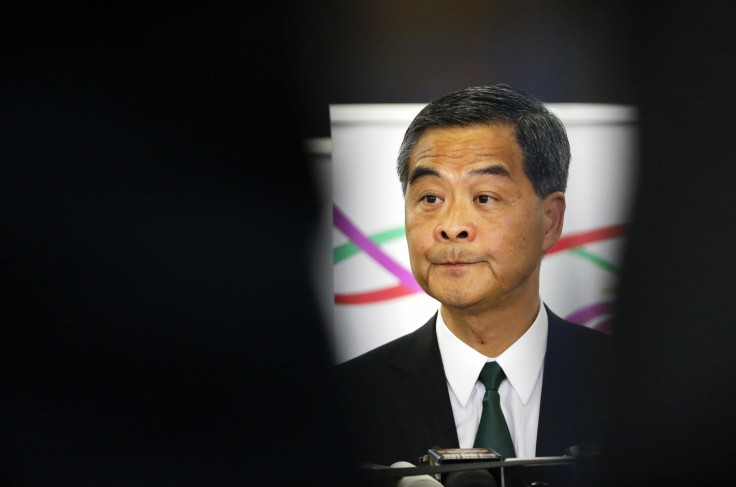HK Chief Executive Hints He May Run For Second Term, Despite Umbrella Movement's Calls For Resignation

SHANGHAI -- The chief executive of Hong Kong, Leung Chun-ying (commonly known as C.Y. Leung), has given the strongest hint yet that he might consider running for a second term. Leung, who faced repeated calls for his resignation during last year’s Umbrella Movement protests in the city, had previously not expressed a clear position on whether he would stand again when his term ends in two years’ time. But he said on Tuesday that he would “not rule out any possibility,” according to the South China Morning Post, adding that he would make a decision on the issue “in later days.”
Leung’s comments are likely to spark renewed political debate in Hong Kong, three months after the end of the Umbrella Movement. The 79-day movement began as a protest against Beijing’s plans for Hong Kong’s 2017 chief executive election: China had promised that, for the first time, all Hong Kong citizens would be allowed to vote for their leader, but later provoked widespread anger when it announced that all candidates for the post would first have to be approved by a 1,200-member ‘Selection Committee’ seen as largely loyal to China -- similar to the one that chose Leung, a businessman with strong ties to China, in 2012.
Leung’s resignation subsequently became one of the demonstrators’ main demands: not only was he widely believed to have ordered police to fire tear gas at unarmed protesters at the start of the movement, he was also seen by many demonstrators as aloof and unaccountable -- and a symbol of China’s growing political control over Hong Kong, which was promised significant autonomy for 50 years when Britain returned it to Chinese sovereignty in 1997.
Leung refused to stand down, however, and also declined to engage in direct dialogue with student leaders of the protest movement. Since the protest encampment outside government offices was cleared peacefully in December, some observers believe he has consolidated his political position in Beijing’s eyes. Nevertheless, his opinion poll ratings have hit record lows, and one survey by Hong Kong University in January showed that 62 percent of respondents did not want him to stand again.
Leung has sought to win back public sympathy by proposing policies that seek to alleviate social and economic disparities in Hong Kong, also a concern of protesters. However, his widely used nickname in Hong Kong, 689, which refers to the number of votes he received from the selection committee in 2012, is a reminder of his continuing perceived unaccountability.
His comments on a possible second term come soon after 27 Hong Kong legislators -- members of the city’s ‘Pan-Democrat’ camp -- pledged to veto the government’s proposals on political reform, including the Beijing-backed rules for ‘universal suffrage’ in the 2017 election. Hong Kong officials have said that if the package is rejected, the next chief executive will again be chosen by the selection committee, under the old rules; and Democrats say they have been specifically warned that this could mean Leung receiving a second term.
Prof. Jean-Pierre Cabestan, head of the department of Government and International Studies at Hong Kong’s Baptist University, said the Beijing and Hong Kong governments have shown no sign of being willing to make any concessions over the political reform package, full details of which have yet to be revealed. “It really seems that the authorities feel the only way to try to convince Democratic legislators to vote for the package is to threaten them with having C.Y. Leung in power for another five years,” he told International Business Times.
Leung on Tuesday also specifically rejected calls for a televised public debate with Pan-Democrats on the reform process, saying that “if there are some fundamental divisions” between the two sides then there "would not be much point in having a debate." He also said there was little evidence of public support for such a debate.
© Copyright IBTimes 2024. All rights reserved.






















